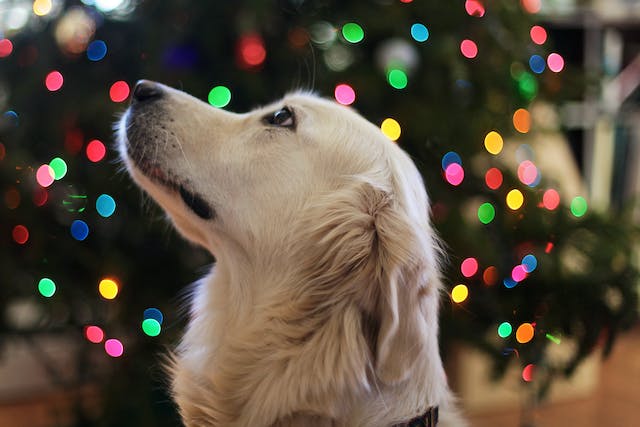Keep your Pets Safe During the Holidays

During the holiday season, it's important to take precautions to keep your pets safe and healthy. With all the festivities and potential hazards, it's easy for accidents to happen. By following these tips, you can ensure that your winter holiday season remains joyful for both you and your furry friend in Omaha.
Plan in advance
It is important to be prepared for emergencies by knowing the location of your 24/7 emergency veterinary clinic. Discuss this with your veterinarian in advance and plan your travel route ahead of time. Keep the clinic's contact numbers easily accessible in case of emergencies.
- Your veterinarian's clinic phone number
- 24/7 emergency veterinary clinic (if different)
- ASPCA Poison Control Center: 888-426-4435
- Pet Poison Helpline: 855-764-7661
Food
It is important to keep people food away from pets and to inform others to do the same. If you wish to give your pets holiday treats, ensure they are specifically made or bought for them. There are certain people foods that pose a significant danger to pets:
- Chocolate is a common treat during holidays, but it can be toxic to pets. It is important to remember that all chocolate should be off limits for dogs and cats, as the harm it can cause depends on factors such as the type of chocolate, the size of the pet, and the amount consumed.
- Other Sweets - It is important to keep other sweets and baked goods out of reach from pets. These treats are often too rich for them and may contain the artificial sweetener xylitol. Xylitol has been linked to liver failure and death in dogs.
- It is important to keep table scraps, such as gravy, sauces, dressing, and meat or poultry fat or skin, away from pets. These foods can be difficult for pets to digest, especially during the holidays when our diets tend to include extra-rich foods. They can even cause pancreatitis. Additionally, bones can pose a choking hazard or lead to intestinal blockage. It is worth noting that many foods that are healthy for people, such as onions, raisins, and grapes, are actually poisonous to pets.
- Unbaked yeast dough can cause problems for pets, including painful gas and potentially dangerous bloating.
Quick action can save lives. If your pet exhibits sudden behavior changes, depression, pain, loss of appetite, vomiting, or diarrhea, it may have consumed something it shouldn't have. In such cases, it is crucial to contact your veterinarian or nearest veterinary emergency clinic without delay. Additionally, you may consider reaching out to the ASPCA Poison Control Center (888-426-4435) or the Pet Poison Helpline (855-764-7661), noting that there may be a fee involved.
Decorating
Holiday plants, lights, candles, and other decorations can make the holidays festive, but they also pose risky temptations for our pets.
- Ornaments pose risks to pets. Breakable ones can cause injuries, while swallowed ones can lead to intestinal blockage or illness. It is important to keep all ornaments, including those made from salt-based dough or other food-based materials, out of pets' reach.
- Tinsel, ribbons, wreaths, and other decorations can be dangerous for pets. If swallowed, they can cause choking or blockages in their intestines.
- Christmas trees - To prevent accidents, secure your Christmas tree to the ceiling or a doorframe using fishing line. This will help prevent tipping if pets climb on it or try to play with the lights and ornaments.
- Water additives for Christmas trees can pose a hazard to pets if ingested. Therefore, it is strongly advised to refrain from adding any substances to the water if there are pets in the household.
- Electric lights can cause burns when a curious pet chews the electrical cords.
- Candles and oil lamps - It is important to be cautious when using candles and oil lamps around pets. Leaving a pet alone in an area with a lit candle or lamp can lead to a fire.
- Flowers and festive plants - It's important to be cautious with flowers and festive plants around pets. Certain plants like poinsettias, amaryllis, mistletoe, balsam, pine, cedar, and holly can be harmful and potentially poisonous if ingested by dogs and cats. The ASPCA provides comprehensive lists of plants that are toxic to pets.
- Potpourris - It is important to keep potpourris out of reach of pets, especially inquisitive ones. Liquid potpourris can be particularly dangerous as they contain essential oils and other ingredients that can cause severe damage to a pet's mouth, eyes, and skin. Non-liquid potpourris, which often contain flowers, leaves, bark, herbs, and/or spices, could also cause issues if ingested by a pet.
Keep your pets safe with these tips and make sure you have a memorable holiday season.
Have your home needs changed in the past year? Perhaps you’ve outgrown your present home, or need to downsize to a more suitable home. If you’re ready to make a move, let’s connect and talk about all the amazing opportunities that are available to you!









